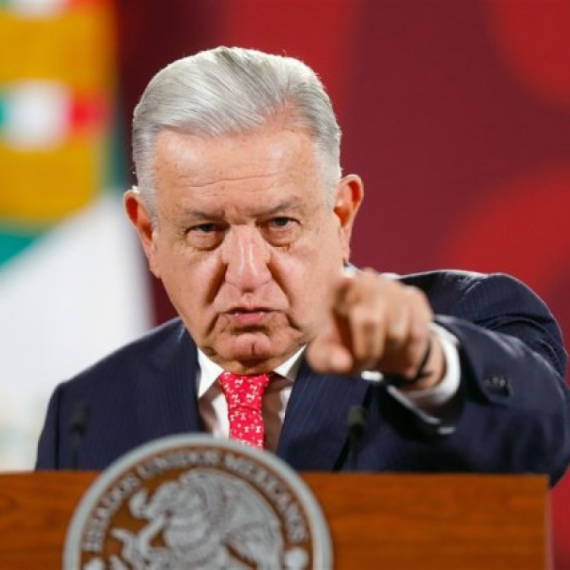EU: 17 expected to recognize Kosovo
The EU has "taken note" of Kosovo Albanians' unilateral declaration of independence.
Monday, 18.02.2008.
10:35

The EU has "taken note" of Kosovo Albanians' unilateral declaration of independence. The Council of Ministers said it is now up to each of the 27 member states to decide whether to recognize Kosovo as an independent country. EU: 17 expected to recognize Kosovo Serbia has rejected the declaration yesterday and considers it illegal. A statement from the meeting also said that the EU is "dedicated to respecting the UN Charter and the Final Helsinki Act when it comes to territorial integrity". When it comes to Serbia, and her province's unilateral secession, the ministers said this was is "a unique case that does not set precedent". After the meeting, German Foreign Minister Frank Walter Steimeir said he expected "17 of the EU's 27 countries to regonize Kosovo". Earlier, Spain and Cyprus were reported as blocking a joint EU Kosovo platform which would be "taking note of" Kosovo's independence. Tanjug has learned from its diplomatic sources at Monday's meeting of the EU Council of Ministers in Brussels, that the session was marked by an hours-long fierce debate on the text of the conclusions. Cyprus was opposed to all EU platforms or conclusions which would open, even indirectly, the doors to the recognition of the secession of Kosovo, while, on the other hand, Spain has proposed its own draft EU conclusion which differs from that filed by the Slovenian presidency. The crucial difference between the two texts was that Slovenia's text does not mention the international law, but mentions the possibility of realizing relations with "the independent state" of Kosovo. Spain's text, however, does not mention the establishing of relations with an "independent state" and underscores that relations with Kosovo should be in accordance with international law. The European Union Council of Ministers met today to discuss further diplomatic moves regarding Kosovo’s unilateral declaration of statehood, rejected by Serbia, but also by Russia, as illegal. A majority of the EU member-countries stated last night that they would wait for today’s meeting before stating their stances on eventually recognizing Kosovo’s sovereignty. For now it is known that the independence of Kosovo is openly opposed by Cyprus, Spain, Romania, Slovakia and Greece. Slovenian Prime Minister Janez Jansa confirmed earlier that the EU was expecting Kosovo to proclaim independence, adding that "all were aware of the fact that every other possibility has been exhausted." Meanwhile in Belgrade, Foreign Minister Vuk Jeremic said that Serbia would recall for consultations its ambassadors from every country that recognizes Kosovo independence. Last night, Jeremic, in a meeting with ambassadors and diplomatic mission chiefs stationed in Belgrade, explained Serbia's the stance regarding the rejection of Kosovo’s unilateral independence proclamation and appealed to their countries to not recognize the temporary institutions in Pristina. Jeremic told the ambassadors what the potential consequences of such an illegal act could have, adding that it could cause challenges regarding the security situation, reiterating that the unilateral proclamation violates international law.
EU: 17 expected to recognize Kosovo
Serbia has rejected the declaration yesterday and considers it illegal.A statement from the meeting also said that the EU is "dedicated to respecting the UN Charter and the Final Helsinki Act when it comes to territorial integrity".
When it comes to Serbia, and her province's unilateral secession, the ministers said this was is "a unique case that does not set precedent".
After the meeting, German Foreign Minister Frank Walter Steimeir said he expected "17 of the EU's 27 countries to regonize Kosovo".
Earlier, Spain and Cyprus were reported as blocking a joint EU Kosovo platform which would be "taking note of" Kosovo's independence.
Tanjug has learned from its diplomatic sources at Monday's meeting of the EU Council of Ministers in Brussels, that the session was marked by an hours-long fierce debate on the text of the conclusions.
Cyprus was opposed to all EU platforms or conclusions which would open, even indirectly, the doors to the recognition of the secession of Kosovo, while, on the other hand, Spain has proposed its own draft EU conclusion which differs from that filed by the Slovenian presidency.
The crucial difference between the two texts was that Slovenia's text does not mention the international law, but mentions the possibility of realizing relations with "the independent state" of Kosovo.
Spain's text, however, does not mention the establishing of relations with an "independent state" and underscores that relations with Kosovo should be in accordance with international law.
The European Union Council of Ministers met today to discuss further diplomatic moves regarding Kosovo’s unilateral declaration of statehood, rejected by Serbia, but also by Russia, as illegal.
A majority of the EU member-countries stated last night that they would wait for today’s meeting before stating their stances on eventually recognizing Kosovo’s sovereignty.
For now it is known that the independence of Kosovo is openly opposed by Cyprus, Spain, Romania, Slovakia and Greece.
Slovenian Prime Minister Janez Janša confirmed earlier that the EU was expecting Kosovo to proclaim independence, adding that "all were aware of the fact that every other possibility has been exhausted."
Meanwhile in Belgrade, Foreign Minister Vuk Jeremić said that Serbia would recall for consultations its ambassadors from every country that recognizes Kosovo independence.
Last night, Jeremić, in a meeting with ambassadors and diplomatic mission chiefs stationed in Belgrade, explained Serbia's the stance regarding the rejection of Kosovo’s unilateral independence proclamation and appealed to their countries to not recognize the temporary institutions in Priština.
Jeremić told the ambassadors what the potential consequences of such an illegal act could have, adding that it could cause challenges regarding the security situation, reiterating that the unilateral proclamation violates international law.




































Komentari 22
Pogledaj komentare